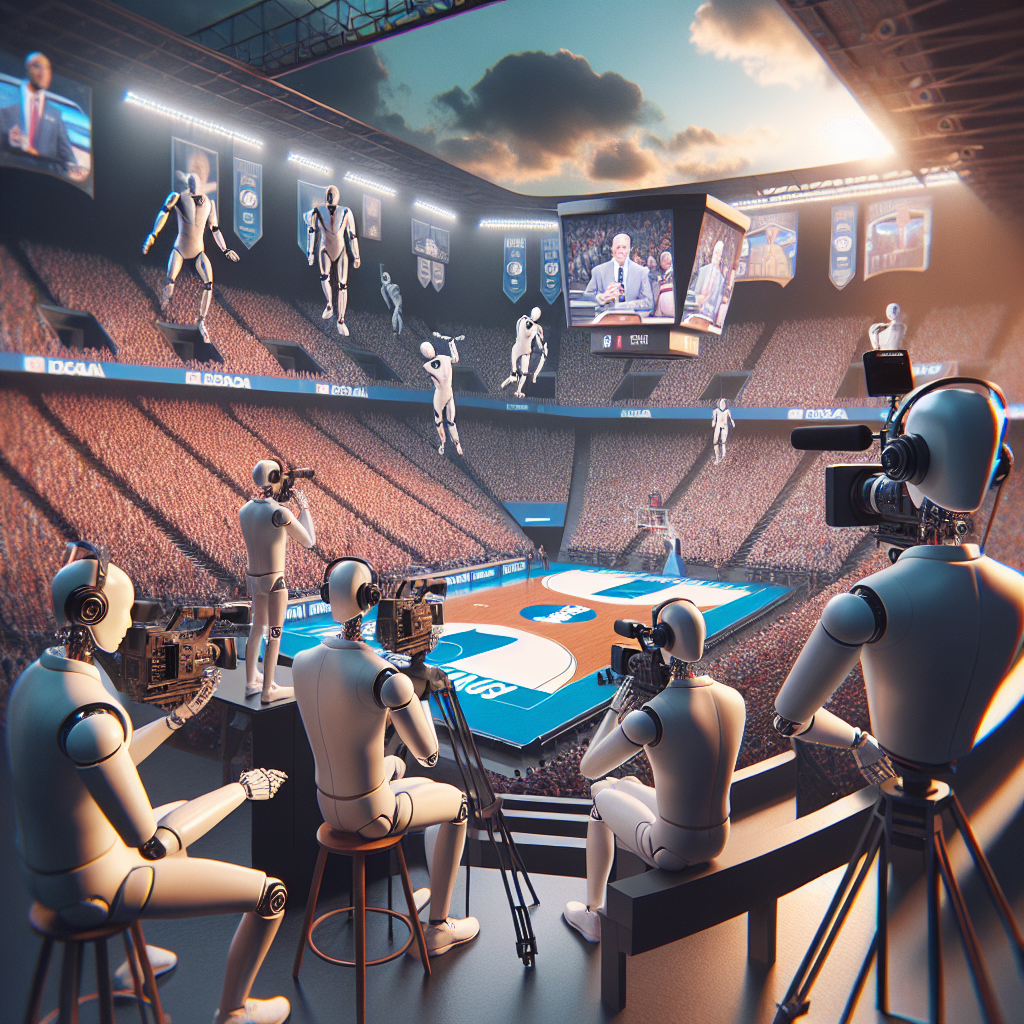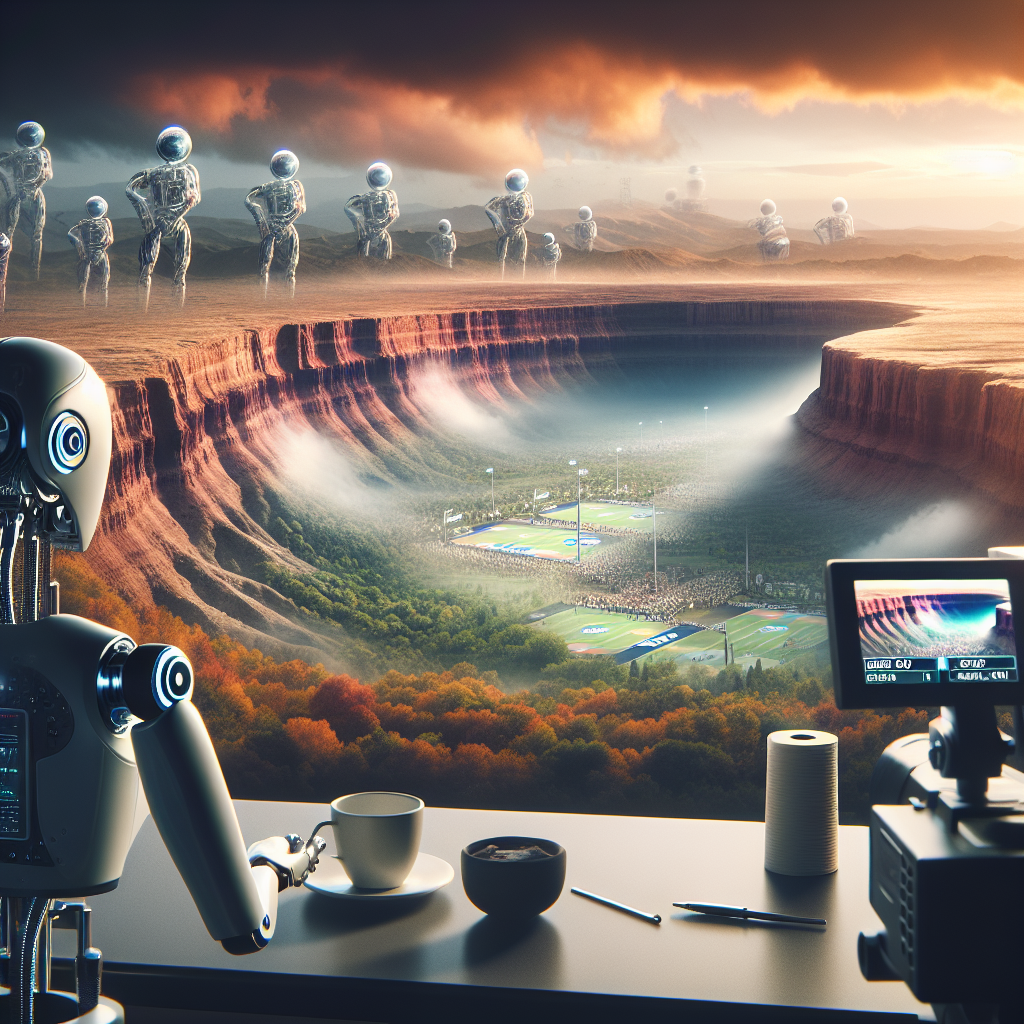AI sportscasters to debut in NCAA Season 99

Advantages of AI Sportscasters in NCAA Season 99
Artificial Intelligence (AI) technology has been making waves in various industries, and now it is set to revolutionize the world of sports broadcasting. In an unprecedented move, the NCAA has announced that AI sportscasters will be making their debut in NCAA Season 99. This groundbreaking development has sparked a debate among sports fans and industry experts alike, with many wondering about the advantages and implications of using AI in sports broadcasting.
One of the key advantages of AI sportscasters is their ability to provide real-time analysis and insights during games. Unlike human commentators who may miss important details or struggle to keep up with the fast-paced action on the field, AI sportscasters are equipped with advanced algorithms that allow them to process vast amounts of data in a matter of seconds. This means that they can offer viewers a more comprehensive and accurate analysis of the game, helping them better understand the strategies and tactics employed by the teams.
Another advantage of AI sportscasters is their consistency and reliability. Human commentators are prone to biases, emotions, and fatigue, which can affect the quality of their commentary. In contrast, AI sportscasters are programmed to remain impartial and objective, ensuring that viewers receive unbiased and consistent analysis throughout the game. This can help enhance the overall viewing experience for fans, as they can rely on AI sportscasters to provide them with accurate and insightful commentary.
Furthermore, AI sportscasters have the potential to enhance the accessibility of sports broadcasting. With the rise of digital platforms and streaming services, more and more fans are turning to online channels to watch their favorite sports events. AI sportscasters can help make sports broadcasting more inclusive by providing real-time translations and closed captioning for viewers with hearing impairments. This can help attract a wider audience to sports events and ensure that everyone can enjoy the game, regardless of their language or abilities.
In addition, AI sportscasters can help improve the overall production quality of sports broadcasts. By analyzing player movements, statistics, and other data in real-time, AI sportscasters can generate interactive graphics and visualizations that enhance the viewing experience for fans. This can help make sports broadcasts more engaging and informative, keeping viewers hooked throughout the game.
Despite these advantages, some critics have raised concerns about the use of AI sportscasters in sports broadcasting. They argue that AI lacks the human touch and emotional connection that human commentators bring to the table. While it is true that AI sportscasters may not be able to replicate the charisma and personality of human commentators, they can still provide valuable insights and analysis that enhance the viewing experience for fans.
Overall, the introduction of AI sportscasters in NCAA Season 99 represents a significant milestone in the world of sports broadcasting. With their ability to provide real-time analysis, consistency, accessibility, and production quality, AI sportscasters have the potential to revolutionize the way we watch and enjoy sports events. While there may be some challenges and concerns to address, the advantages of using AI in sports broadcasting are clear, and it will be exciting to see how this technology continues to evolve in the future.
Impact of AI Sportscasters on Fan Engagement

Artificial intelligence (AI) technology has been making waves in various industries, and now it is set to revolutionize the world of sports broadcasting. In an unprecedented move, the NCAA has announced that AI sportscasters will make their debut in Season 99. This groundbreaking development is expected to have a significant impact on fan engagement and the overall viewing experience.
One of the key benefits of AI sportscasters is their ability to provide real-time analysis and insights during games. These AI commentators are equipped with advanced algorithms that can process vast amounts of data in a matter of seconds, allowing them to offer in-depth analysis that human commentators may not be able to provide. This level of analysis can enhance the viewing experience for fans, giving them a deeper understanding of the game and its intricacies.
Furthermore, AI sportscasters have the potential to reach a wider audience than traditional human commentators. With the rise of digital platforms and streaming services, fans from around the world can tune in to watch their favorite teams compete. AI sportscasters can provide commentary in multiple languages, making the games more accessible to a global audience. This increased accessibility can help to grow the fan base and generate more interest in NCAA sports.
In addition to providing analysis and reaching a wider audience, AI sportscasters can also personalize the viewing experience for fans. By analyzing user data and preferences, AI commentators can tailor their commentary to suit the individual tastes of each viewer. This level of personalization can make fans feel more connected to the game and enhance their overall enjoyment of the viewing experience.
Despite the many benefits of AI sportscasters, there are some concerns about the impact they may have on the sports broadcasting industry. One of the main concerns is the potential displacement of human commentators. As AI technology continues to advance, there is a fear that human commentators may be replaced by their AI counterparts. This could have a negative impact on the livelihoods of professional commentators and could lead to a loss of jobs in the industry.
Another concern is the potential for bias in AI commentary. While AI sportscasters are programmed to be impartial and objective, there is always a risk of bias creeping into their analysis. This could lead to a lack of credibility and trust among fans, ultimately undermining the integrity of the sports broadcasting industry.
Despite these concerns, the introduction of AI sportscasters in NCAA Season 99 is a significant step forward for the world of sports broadcasting. The use of AI technology has the potential to enhance the viewing experience for fans, reach a wider audience, and personalize the commentary to suit individual preferences. While there are challenges that need to be addressed, the benefits of AI sportscasters far outweigh the potential drawbacks. Fans can look forward to a more immersive and engaging viewing experience in the upcoming season, thanks to the introduction of AI sportscasters.
Challenges and Limitations of AI Sportscasters in NCAA Season 99
Artificial Intelligence (AI) has been making waves in various industries, and now it is set to revolutionize the world of sports broadcasting. In the upcoming NCAA Season 99, AI sportscasters will make their debut, providing commentary and analysis for viewers. While this development is exciting, it also comes with its own set of challenges and limitations.
One of the main challenges of using AI sportscasters is the lack of human emotion and intuition. Traditional sportscasters are able to convey excitement, passion, and empathy, which can enhance the viewing experience for fans. AI, on the other hand, lacks the ability to truly understand and connect with the emotions of the game. This could result in a less engaging and dynamic commentary for viewers.
Another limitation of AI sportscasters is their inability to adapt to unexpected events or changes in the game. Human sportscasters are able to think on their feet, providing insightful analysis and commentary in real-time. AI, however, relies on pre-programmed algorithms and data, which may not always be able to accurately predict or respond to unforeseen circumstances. This could lead to a less informative and relevant commentary for viewers.
Furthermore, AI sportscasters may struggle with providing context and background information that human sportscasters excel at. Human commentators are able to draw on their knowledge and experience to provide valuable insights and anecdotes that enhance the viewer’s understanding of the game. AI, on the other hand, may struggle to provide the same level of depth and nuance in its commentary.
Despite these challenges and limitations, AI sportscasters also have the potential to offer unique advantages. For example, AI can process and analyze vast amounts of data in real-time, providing viewers with instant statistics and insights that human commentators may not be able to deliver. This could enhance the viewer’s understanding of the game and provide a more data-driven analysis of player performance and strategy.
Additionally, AI sportscasters have the potential to reach a wider audience and provide commentary in multiple languages, making sports broadcasting more accessible and inclusive. This could help to attract new fans and expand the reach of sports coverage to a global audience.
In conclusion, while AI sportscasters present exciting opportunities for innovation in sports broadcasting, they also come with their own set of challenges and limitations. The lack of human emotion and intuition, the inability to adapt to unexpected events, and the struggle to provide context and background information are all factors that could impact the viewer’s experience. However, AI also offers unique advantages, such as real-time data analysis and multi-language commentary, that could enhance the viewer’s understanding and enjoyment of the game. As AI continues to evolve and improve, it will be interesting to see how it shapes the future of sports broadcasting in NCAA Season 99 and beyond.

